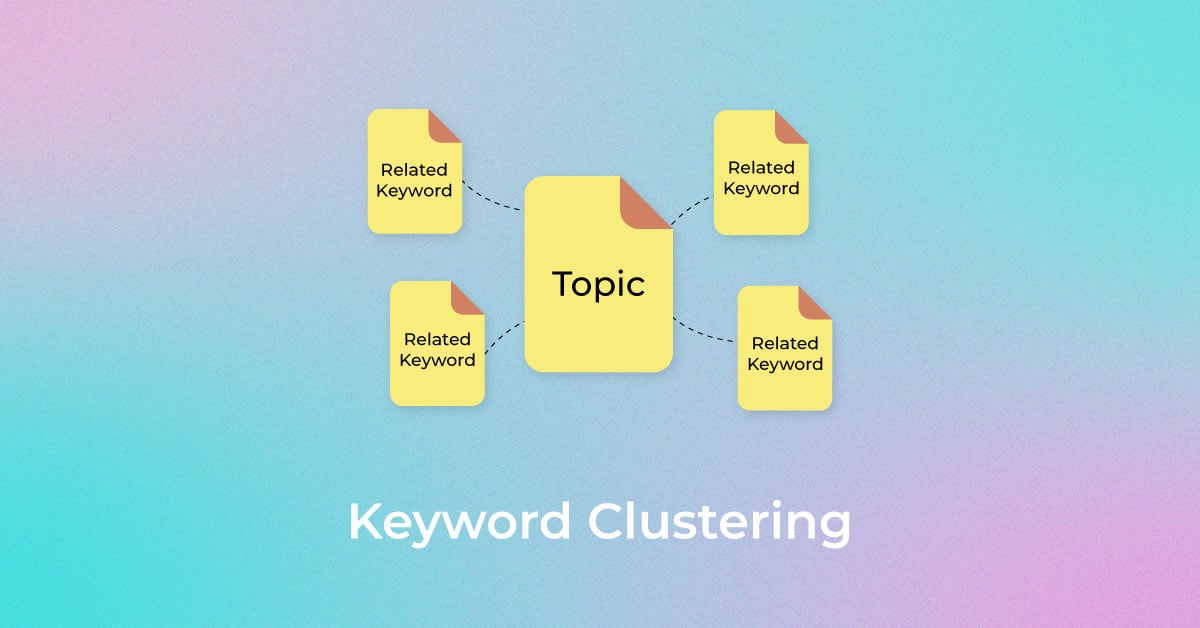What Is Keyword Clustering & How It Helps SEO
The art of keyword clustering involves grouping related keywords together, enabling search engines to better understand the context and relevance of the content. When implementing keyword clustering, it's crucial to create cohesive and comprehensive content that seamlessly incorporates the targeted keyword clustering throughout.
Author:Suleman ShahReviewer:Han JuFeb 28, 20245.3K Shares189.8K Views

You are undoubtedly aware of SEO as a digital marketer and the reasons it should be considered when developing content. The collection of standards and regulations known as search engine optimization, or SEO, aids in content's natural online discovery. Marketers include keywords in their planning tactics to optimize for search engines.
The precise words and phrases that users enter into a search engine to get results are known as keywords. When you include keywords in your material, it may show up in searches and, if done correctly, can propel it to the top of the results page. However, utilizing keywords becomes harder as Google and other search engines keep refining and enhancing their algorithms.
Using the concept of keyword clustering, you may improve your content and target certain search intentions with it. This post will explain subject clusters and keyword clustering and demonstrate how to conduct keyword clustering correctly.
What Is Keyword Clustering?
Target keywords are grouped in groups, or this example, clusters, using a technique called keyword clustering to segregate those termsabout website content. This is a tactic used by search engine optimization (SEO) experts to rank better in search results.
They will first do keyword research, organize the terms into more manageable clusters, and then disperse the clusters over the pages of a website to use this strategy. Four clustering tools, which we will discuss later in this article, are used to automate the keyword clustering process.
Differences Between Keyword Clustering And Topic Clustering
The distinction between topic clustering and keyword clustering is subtle. Grouping related words or phrases according to their semantic or contextual similarities is known as keyword clustering. The method groups individual keywords into clusters to find patterns and connections between them.
However, topic clustering groups articles that are associated with certain subjects. It groups all of the material into topic groupings. It works by starting with a master subject called the pillar page or the main material and then creating topic clusters, or related topics, around it.
One such example of pillar content might be a page dedicated to customer relationship management, with subtopics covering CRM marketing, CRM software, CRM meaning, and so on. Building topical authority is best achieved by subject clustering, but only with the appropriate internal connection.
Throughout the subject clusters, provide relevant internal links, mostly leading to the pillar page. By doing this, you lead visitors through a network of related, insightful content that lengthens their stay on your page and signals to Google's algorithm that your website is worthy of being rewarded.
Benefits Of Keyword Clustering
Clustering keywords has the advantage of enhancing your comprehension of search intent. By grouping related terms, you target a subject (user intent) rather than a single keyword and are thus more likely to cover this goal. This is how intent-focused SEO responds to users more comprehensively.
These term clusters based on search intents explain the context and provide a better idea of the kind of content that should be produced to give people what they want. You may decide how to promote various areas of your website, find the terms that are worth ranking for, and arrange material across pages more skillfully. By doing this, you'll benefit;
Maximize The Number Of Terms To Rank For
Instead of focusing on individual queries at a time, keyword clusters allow you to rank for a group of comparable phrases that are unified by the same purpose.
Eliminate Any Extraneous Keywords
A long list of keywords becomes more manageable and thorough when they are grouped; you can quickly identify queries that aren't relevant.
The keyword grouper program from SE Ranking will provide you with ungrouped keywords that don't fit any of the topics it can identify, allowing you to double-check whether you still need them in your plan.
Recognize The Possibilities Of Segments
The resulting keyword clusters will assist you in understanding the relationships between various pieces of material. Through this procedure, you'll be able to assess the many categories your site falls into and if it needs to be added to from a search engine's point of view.
Create An Effective Site Structure Or Analyze The Existing One
You may examine the semantic connections between your pages and enhance the architecture of your website by using keyword clustering.
Boost The Authority And Exposure Of Your Website
With the help of keyword grouping, you may improve your understanding of semantics and the impact of your content, both of which will increase the authority of your website in search engine results.
Reduce Time Spent And Get Rid Of Mistakes
When carried out automatically, keyword clustering rapidly and effectively provides all of the aforementioned advantages.
How To Do Keyword Clustering?
Choose A Central Topic
The first step is to choose a subject that is relevant to your company. It must strike a balance between being too wide and too specific.
- Choose subjects that individuals would seek when doing an informative search, that is, subjects that the average person would be curious to learn more about.
- In this manner, you may force people to visit the cluster pages and learn more about the subject.
Conduct Keyword Research
Decide which main keyword you want to focus on with your website. Next, search for both long-tail and short-tail keywords that are variants of the same term. Additionally, you may look for relevant terms that users may use in their search searches. Additionally, you will want each term's volume, which may be found using a keyword research tool such as Ahrefs or Google Search Console.
Use a keyword research tool to see what keywords your rivals are using and then seek for relevant keywords to begin your keyword study. Keep in mind that there are several kinds of search queries while doing research. They may be analyzed using a variety of criteria, but the most often used ones are as follows;
- Length (or word count) and specificity (question-like inquiries and both long and short-tail keywords). In addition to having a very high search volume, short-tail keywords are notoriously hard to rank for. Thus, the primary focus of this categorization is the competitiveness of the term.
- User intent (commercial, transactional, informative, and navigational). You can determine the kind of page you need to make for certain keywords and the chance of conversion based on the various objectives that people have.
Categorize Your Keywords
Before understanding how to cluster keywords, you need to comprehend the components of a successful keyword cluster. The search purpose of grouped terms should be consistent above everything else.
You may grasp search intent intuitively. It's not always evident, however. Examine the search engine results page (SERP) for the term first. Concerning the kind of search intent;
- Informational - People are eager to find out more details.
- Navigation- People are looking for a certain page.
- Commercial - Before making a purchase, consumers want to do research.
- Transactional - Users want to finish a certain task, like making a purchase.
Creating Keyword Clusters
Now that you have an exhaustive list of all the keywords that are already used in your niche, it's time to group keywords and remove those that you won't require. After comparing the advantages and disadvantages of grouping manually and automatically, let's go over all the processes required to cluster your queries in SE Ranking.
Manual Keyword Clustering Strategy
You may manually generate keyword clusters by filtering the list based on the word roots or intent type. For instance, you get a ton of questions about "photo editing software."
- Various kinds of phrases may be found by keeping the search goal in mind. Think about queries. Check the purpose behind the term by Googling it and then visiting the top sites from the search results to have a complete understanding of what people are looking for. This will allow you to segment queries more successfully.
- You may categorize keywords that include similar phrases by identifying every term that shows up in the search results, such as "picture editor," "collage creator," "photo editor," and so on.
- Tags may be made for several elements of a term, such as device specification (PC, Mac, Android, iOS, etc.), transactional intent (purchase, download, install, locate, etc.), and use kind (online and offline). After that, you'll need to group the tags by cross-matching them.
Create & Optimize Pillar Pages For Your Keyword Clusters
Your keywords serve as a guide for creating, optimizing, and arranging the content on your website after you've grouped them into clusters. In essence, your keyword clusters stand for the main subjects of your website. Another name for them is "pillar pages." For our software platform, we found two main term clusters in the sample we used earlier.
We must develop landing pages for each of those keyword clusters to effectively implement our keyword clustering. The platform's interview scheduling tool needs to have its home page. The virtual interviewing tool needs to be the main emphasis of the other landing page.
Your keyword clusters' pillar pages need to follow on-page SEO best practices. Using a content optimization tool to help you improve your material more efficiently is one of my favorite tactics. Give the following areas a priority if you want to increase the ranking potential of your pillar pages;
- Depth of Topic- Write long-form material that delves deeply into the subject.
- Architecture of Information - Make sure your structure is obvious and that your h2s and h3s include your keyword phrases.
- Experience on Page- Includes interactive on-page components that enhance the user experience, such as carousels, jump links, and movies.
Reinforce Your Keyword Clusters With Blog Content
You may develop blog material that supports your main keyword clusters to raise the authority and ranking of your pillar sites. These blogs may focus on queries about your main keywords, subtopics, or longer-tail keyword phrases.
- Your website's webpages will be organized into "topic clusters" as you add more material.
- The landing pages on your website will rank differently in Google depending in large part on the internal linking profile of this content.
- To improve your chances of ranking for those higher-value keywords, your blog entries should include backlinks pointing to the relevant pillar page.
- You may create additional clusters on your website if your company offers a variety of goods or services.
You will find fewer keyword clusters if you simply provide one main product or service. Nevertheless, you may outrank your rivals faster by focusing on your main subject areas and producing a ton of valuable material in those areas.
Top Tools For Keyword Clustering
Online resources and platforms are necessary for keyword research, and various tools are also necessary for keyword clustering. The top keyword clustering tools are listed below, so utilize them to maximize your research and form subject groupings for your SEO and content development plans.
Cluster AI
Cluster AI is a terrific choice with an easy-to-use interface that can be used anywhere around the globe and yields valuable results. There aren't many features, however, and none of the keywords you create are given any further information.
It's a good, basic tool to start with, but if you want to go into additional keyword research choices, you may want to look into another alternative.
Writerzen Keyword Explorer
With its clear, user-friendly design, the WriterZen Keyword Explorer provides quick, precise results that are enjoyable for users. Additionally, it's a highly cost-effective choice that offers an excellent return on investment.
You may utilize a variety of keyword research tools for your keyword clustering, and the keywords you develop will provide extensive data.
Surfer SEO Content Planner
One of the simplest content planners and keyword clustering tools is Surfer SEO. It has no additional costs, and keyword clustering works very well with the platform's other capabilities.
It can build clusters more quickly than many of the other tools on this list and has a high accuracy rate for both search intent and search volume.
Serpstat
Serpstat analyzes published content to identify the finest and most relevant subject clusters and assists you in gathering data for the various search queries that your viewers are using It can also assist you with custom keyword grouping, and when creating keyword groups, it considers both user intent and semantics.
The greatest part is that instead of being an additional fee, the keyword clustering features are part of the standard plans.
SE Ranking Keyword Grouper
Together with many other helpful functions, the SE Ranking keyword grouper tool also provides keyword clustering.
You may get the greatest possibilities for your keyword clusters that will help you move up the search engine results page rankings on this dependable, user-friendly site with sophisticated keyword tools that assist you in creating lists of related keywords that can be employed in your cluster.
Frequently Asked Questions
Can Keyword Clustering Help Identify Content Gaps?
Yes, keyword clustering can reveal areas where a website lacks content coverage by identifying clusters with high search volume or relevance but low existing content.
How Does Keyword Clustering Aid In Content Strategy?
Keyword clustering guides content creation by highlighting thematic clusters, enabling marketers to create comprehensive content plans that address various aspects of a topic or keyword group.
Is Keyword Clustering A One-Time Process?
No, keyword clustering is an ongoing process as search trends evolve, new keywords emerge, and website content changes. Regular updates to keyword clusters ensure alignment with current SEO objectives.
What Factors Are Considered When Clustering Keywords?
Factors such as search intent, semantic similarity, user behavior, and contextual relevance are considered when clustering keywords to ensure accurate groupings.
Final Thoughts
Keyword clustering is a crucial component of any SEO plan. Let's say you have a poorly structured website with themes categorized under quite different headings. If so, it indicates that you need to improve your website for easier reading and navigation. The significance of term clustering is further supported by two factors. The reason for this is that they led Google to emphasize two of the most important factors - indexing and natural language.
More relevant and organic keywords may be embedded into pages with the help of keyword clustering. Because every page will already be properly arranged into groups under their pertinent topics, it also aids in Google indexing.

Suleman Shah
Author
Suleman Shah is a researcher and freelance writer. As a researcher, he has worked with MNS University of Agriculture, Multan (Pakistan) and Texas A & M University (USA). He regularly writes science articles and blogs for science news website immersse.com and open access publishers OA Publishing London and Scientific Times. He loves to keep himself updated on scientific developments and convert these developments into everyday language to update the readers about the developments in the scientific era. His primary research focus is Plant sciences, and he contributed to this field by publishing his research in scientific journals and presenting his work at many Conferences.
Shah graduated from the University of Agriculture Faisalabad (Pakistan) and started his professional carrier with Jaffer Agro Services and later with the Agriculture Department of the Government of Pakistan. His research interest compelled and attracted him to proceed with his carrier in Plant sciences research. So, he started his Ph.D. in Soil Science at MNS University of Agriculture Multan (Pakistan). Later, he started working as a visiting scholar with Texas A&M University (USA).
Shah’s experience with big Open Excess publishers like Springers, Frontiers, MDPI, etc., testified to his belief in Open Access as a barrier-removing mechanism between researchers and the readers of their research. Shah believes that Open Access is revolutionizing the publication process and benefitting research in all fields.

Han Ju
Reviewer
Hello! I'm Han Ju, the heart behind World Wide Journals. My life is a unique tapestry woven from the threads of news, spirituality, and science, enriched by melodies from my guitar. Raised amidst tales of the ancient and the arcane, I developed a keen eye for the stories that truly matter. Through my work, I seek to bridge the seen with the unseen, marrying the rigor of science with the depth of spirituality.
Each article at World Wide Journals is a piece of this ongoing quest, blending analysis with personal reflection. Whether exploring quantum frontiers or strumming chords under the stars, my aim is to inspire and provoke thought, inviting you into a world where every discovery is a note in the grand symphony of existence.
Welcome aboard this journey of insight and exploration, where curiosity leads and music guides.
Latest Articles
Popular Articles



